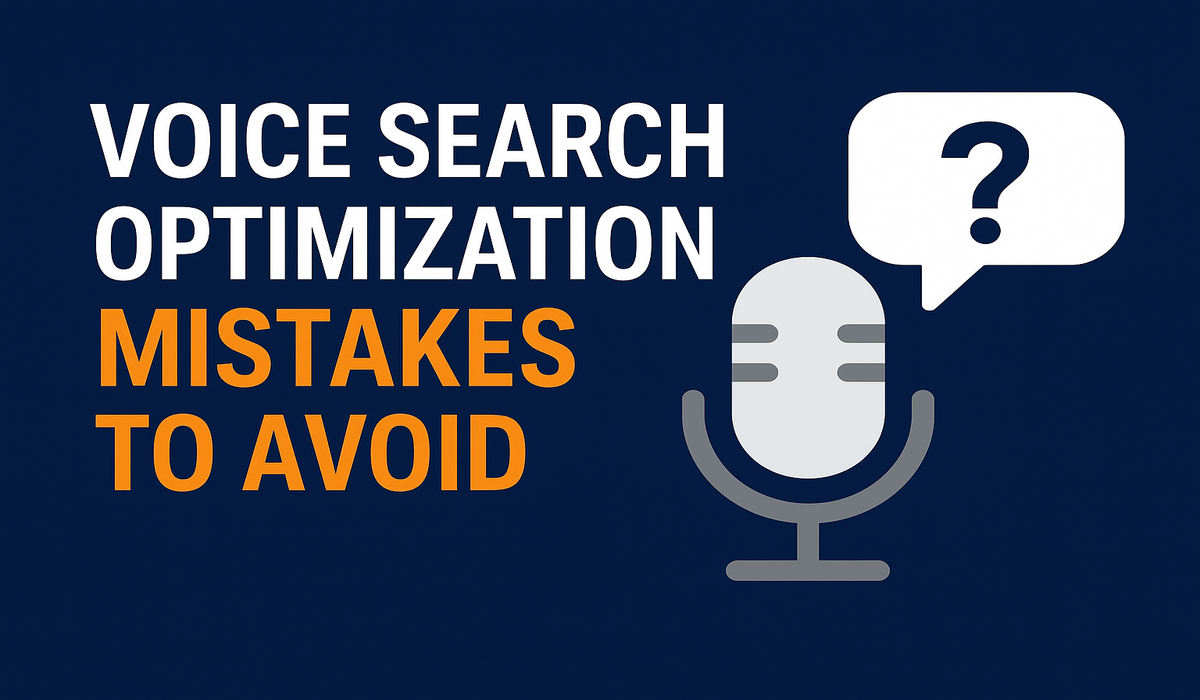Discover the top voice search optimization mistakes to avoid. Learn how to fix them and boost your SEO strategy to reach more voice-enabled users effectively.
Table of Contents
Introduction: Voice Search Optimization Mistakes to Avoid

With the upward push of Alexa, Google Assistant, and Siri, voice search has emerge as an essential a part of digital advertising and marketing. Millions of customers at the moment are talking their queries in preference to typing them. This shift is changing how agencies optimize for search engines like google.
But right here’s the assignment: many companies are making voice search optimization mistakes that prevent them from attaining their target audience. Fixing those mistakes permit you to enhance visibility, improve site visitors, and provide a better person experience.
In this weblog, we’ll explore the most common voice search optimization mistakes to avoid, give an explanation for why they count number, and give practical recommendations to get them proper.
Understanding Voice Search
Before leaping into mistakes, let’s fast recap what makes voice seek specific.
- Conversational tone – Voice queries sound greater natural than typed ones.
- Longer phrases – Instead of typing “first-rate pizza NYC,” humans say, “Where can I locate the first-rate pizza in New York City?”
- Local reason – A huge percentage of voice searches are location-based totally, like “close to me” queries.
If you’re not optimizing with those differences in thoughts, you’re probably falling into a few common traps.
Common Voice Search Optimization Mistakes to Avoid

1. Ignoring Conversational Keywords
One of the biggest voice search optimization mistakes to avoid is focusing only on brief, traditional keywords. People talk in complete sentences, no longer keywords.
Wrong technique: Targeting simplest “high-quality smartphones.”
Better approach: Optimizing for “What is the great smartphone below $500 in 2025?”
Fix: Use herbal, conversational terms and long-tail keywords that suit how humans talk.
2. Forgetting About Local SEO
Most voice searches are neighborhood. Users often say things like:
- “Coffee store near me”
- “Best dentist in Los Angeles”
If you forget about local search engine optimization, you’re missing out on a huge target audience.
Fix:
- Claim and optimize your Google Business Profile.
- Add “close to me” variations and neighborhood key phrases.
- Keep NAP (Name, Address, Phone) steady throughout platforms.
3. Overlooking Featured Snippets
Voice assistants often read answers directly from featured snippets. If your content isn’t structured to win snippets, you’ll lose visibility.
Fix:
- Provide direct answers to common questions.
- Use bullet points, lists, and short paragraphs.
- Add FAQ sections to your content.
4. Writing Robotic Content
A common voice search optimization mistake to avoid is creating keyword-stuffed, robotic content. Voice search thrives on natural language.
Fix: Write conversationally. Pretend you’re answering a friend’s question. Use simple, direct, and helpful wording.
5. Neglecting Mobile Optimization
Most voice searches happen on mobile. If your website isn’t mobile-friendly, you’ll frustrate users and drop in rankings.
Fix:
- Use responsive design.
- Improve site speed.
- Make sure buttons and menus are easy to tap.
6. Ignoring Page Speed
Voice users expect quick answers. If your site loads slowly, they’ll bounce instantly.
Fix:
- Compress images.
- Use caching.
- Minimize unnecessary plugins or scripts.
7. Not Adding Schema Markup
Schema helps search engines understand your content. Without it, you miss chances to appear in voice search results.
Fix: Add schema for FAQs, products, events, and local business details.
8. Forgetting FAQs
Voice queries often start with “who,” “what,” “where,” or “how.” If you don’t have FAQs, you’re missing valuable ranking opportunities.
Fix: Build detailed FAQ sections that answer user questions clearly and concisely.
9. Ignoring Long-Tail Opportunities
Many marketers stick with short keywords because they seem popular. But in voice search, long-tail is everything.
Fix: Use tools like AnswerThePublic, SEMrush, and Google’s People Also Ask to find long-tail queries.
10. Failing to Track Performance
Another voice search optimization mistake to avoid is not tracking progress. If you don’t measure, you won’t know what works.
Fix:
- Monitor keyword performance with analytics tools.
- Track rankings for long-tail and voice-specific phrases.
- Measure local traffic growth.
11. Overlooking Natural User Intent
Sometimes businesses create content for search engines, not people. That’s a mistake.
Fix: Understand your audience’s intent. Are they asking for information, making comparisons, or ready to buy? Tailor answers accordingly.
12. Skipping Multilingual Voice Queries
If your audience is global, ignoring other languages is a huge miss. Voice search is multilingual by nature.
Fix: Optimize content for different languages and cultural contexts.
Why Avoiding These Mistakes Matters
By correcting those voice search optimization mistakes, you may:
- Improve visibility in seek effects.
- Capture exceedingly targeted site visitors.
- Boost local enterprise presence.
- Provide quicker, better answers for your target market.
Future of Voice Search

Voice seek will simplest continue to grow with smart gadgets, motors, and home assistants becoming everyday equipment. Brands that restoration those errors now will dominate destiny seek developments.
Conclusion
Optimizing for voice seek is not optionally available. It’s a need to in case you want to stay beforehand in search engine marketing. But many entrepreneurs fall into not unusual traps that restriction their attain.
The appropriate information? By figuring out and solving those voice search optimization mistakes to avoid, you could stand out, serve your target market better, and force more site visitors for your website online.
Start these days. Your audience is already asking questions—make certain you’re the one answering them.
FAQs about Voice Search Optimization Mistakes to Avoid
Q1. Why is voice search important for SEO?
Voice search is growing swiftly and facilitates businesses seize conversational, real-world queries.
Q2. What are the biggest voice search optimization mistakes to avoid?
Ignoring neighborhood search engine optimization, skipping FAQs, neglecting cellular optimization, and writing robot content material are pinnacle errors.
Q3. How can I optimize content for voice search?
Use conversational long-tail keywords, FAQs, schema markup, and local optimization.
Q4. Does page speed matter for voice search?
Yes. Faster sites rank higher and provide a smoother experience for cellular and voice customers.
Q5. Can small businesses benefit from voice search optimization?
Absolutely! Local businesses can appeal to “near me” searches and advantage visibility amongst equipped-to-convert users.


2 thoughts on “Voice Search Optimization Mistakes to Avoid”